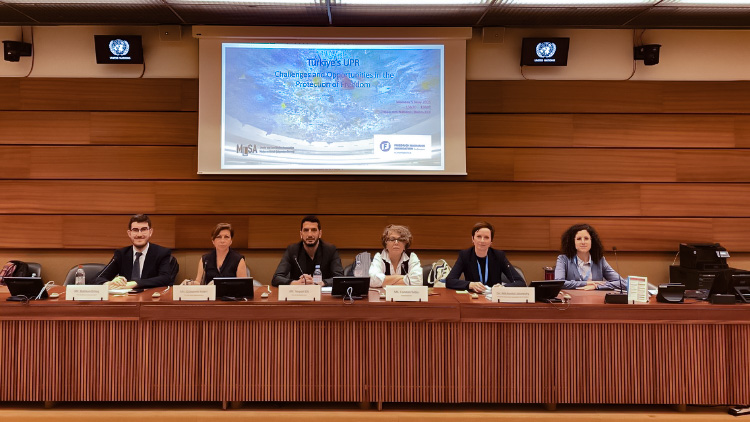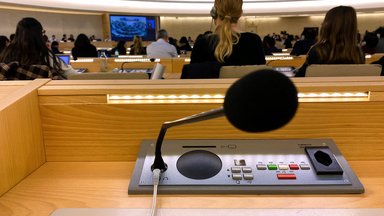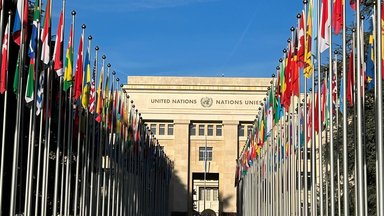Universal Periodic Review
Reflecting on the UPR for Türkiye – Key Takeaways from Our Side-Event and the Formal Review

The Deteriorating Human Rights Situation in the Country
According to Veysel Ok, a lawyer and co-director of the Media and Law Studies Association (MLSA), 24 journalists are currently imprisoned in Türkiye (with a cumulative number much higher), and hundreds more face trial on terrorism-related charges. MLSA’s trial monitoring program recorded over 600 hearings involving 366 journalists, 860 activists, and 376 students in 2024 alone. Journalists are frequently charged with “insulting the president” or “spreading disinformation”—terms left intentionally vague under the 2022 “Disinformation Law,” which has resulted in over 6,000 investigations and at least 60 journalist interrogations.
Candan Yıldız, editor of the independent outlet T24, emphasized how legal harassment is often accompanied by police violence. Seven journalists covering protests against the politically motivated arrest of Istanbul Mayor Ekrem İmamoğlu were detained in house raids. Their equipment and press credentials were deliberately obscured in police files. Despite their clear professional status, they now face trial based on flimsy evidence. As Yıldız noted, the right to receive information—central to democracy—is severely undermined.
Beyond journalism, civil liberties across the board are under attack. Lawyer Gülseren Yoleri from the Human Rights Association of Istanbul outlined the conditions in Turkish prisons. With over 403,000 detainees held in facilities designed for 300,000, severe overcrowding is the norm. Some 4,110 children are among the incarcerated. Isolation and poor access to healthcare have led to hundreds of deaths—709 in just the first 11 months of 2024. New prisons are built to intensify isolation, likened by inmates to coffins or wells.
Particularly concerning is the targeting of women and LGBTI+ individuals. Türkiye’s 2021 withdrawal from the Istanbul Convention on violence against women has coincided with a sharp rise in femicides: at least 394 women were killed in 2024 alone, with another 259 dying under suspicious circumstances. Alarmingly, 46 of these women had previously sought and received state protection orders that were not enforced.
Freedom of assembly is also increasingly restricted. Peaceful protests—such as the Saturday Mothers’ vigils for disappeared relatives—remain banned despite Constitutional Court rulings. In 2024, over 1,100 people were prosecuted under Türkiye’s protest law (Law No. 2911).
Lastly, digital surveillance has increased, further obstructing access to information. In 2023 alone, over 210,000 URLs, 14,680 news articles, and 5,641 social media posts were blocked. Platforms like Twitter were restricted during crises, including the 2023 earthquake, hampering rescue operations. The newly introduced cybersecurity law criminalizes reporting on data leaks, threatening whistleblowers and independent outlets with up to five years in prison.
All this firsthand information shared by our partners in Geneva indicate that Türkiye’s human rights backsliding is neither accidental nor temporary. It reflects a deliberate strategy to consolidate power through the suppression of dissent, dismantling of institutional checks, and widespread intimidation of civil society. In fact, a negligible number of recommendations from the third cycle (304 in total, out of which 214 were supported) appeared to have been implemented or genuinely addressed by the government.
Fourth Cycle of the UPR: Summary of key recommendations
After the presentation of the national report by the high-level Turkish delegation, 125 Member States provided more than 340 recommendations that can be grouped by order of importance and synthesized as following:
- Gender Equality and Violence Against Women: Nearly half the interventions called for stronger measures to combat gender-based violence, from criminalizing femicides and domestic violence to specific legislative changes towards gender equality. Many States expressed concern over Turkey’s withdrawal from the Istanbul Convention and urged Türkiye to reconsider its decision.
- Rule of law and judicial independence: Countries including Germany, Canada, India, and Switzerland emphasized the need for an independent judiciary, reform of the Council of Judges and Prosecutors, and respect for court rulings—particularly those of Turkey’s own Constitutional Court and the European Court of Human Rights (ECtHR). Several states called for ending politically motivated prosecutions of judges, lawyers, and elected officials.
- International instruments: More than 45 recommendations focused on the need for Türkiye to adhere to instruments (such as the Rome Statute, the Convention on Enforced Disappearances, and the ILO no.189 on decent work), and revise its reservations (notably around the ICCPR).
- Child Protection and Education: Dozens of recommendations aimed at enhancing access to education, particularly for marginalized children, and called for stronger measures against child labor and violence. States also emphasized the importance of inclusive education and safeguarding children’s rights.
- Freedom of Expression, Freedom of the Press, and Freedom of Assembly: Concerns were raised about the increased restrictions on journalists, activists, and civil society organizations, with calls for repealing or amending laws that hinder freedom of speech, for stopping arbitrary arrests of journalists, and for allowing unrestricted online expression.
- LGBTQI+, Persons with disabilities, older persons, minorities, and migrants: Amid the weakening of the rule of law and existing protections, more than two dozen recommendations specifically focused on the rights of minorities and indicated backsliding from the previous review cycle.
Other thematic areas included the country’s NHRI, human trafficking measures, prison conditions and torture, climate change and disaster risk reduction.
Beyond Box-Ticking: Building on the UPR for Impactful Advocacy
While Türkiye’s engagement in the UPR process appears procedural, it remains one of the few forums where international scrutiny is unavoidable. However, the rapid changes in international affairs, and the increasing pressures on the UN system is weakening the UPR’s ability and appetite for concrete improvements after the exercise ends in Geneva. In short, Member States tap themselves on the back for participating, while repression widens everywhere. The real challenge for civil society is ensuring that this momentum does not end with diplomatic niceties and unfulfilled promises.
While this UPR cycle may look like a missed opportunity, it holds the key to further monitoring and documentation of Türkiye’s own commitments, and forms a new baseline to hold the country accountable once more. Only sustained, strategic, and coalition-based national advocacy can transform this process into meaningful change for the country’s most vulnerable communities.
High-level Segment at the UN Human Rights Council

The United Nations Human Rights Council (HRC) 58th session engaged in a segment featuring keynote speeches from high-level representatives such as Antonio Guterres, the Secretary-General of the UN, the High Commissioner for Human Rights Volker Türk and 116 Foreign, Deputy or Prime Ministers speaking on behalf of their countries.
Universal Periodic Review Session 48: Iran

Iran underwent its fourth Universal Periodic Review, a peer review of the human rights records of all 193 UN Member States.
Universal Periodic Review Session 48: Slovenia

Slovenia underwent its fourth Universal Periodic Review, a peer review of the human rights records of all 193 member states.
